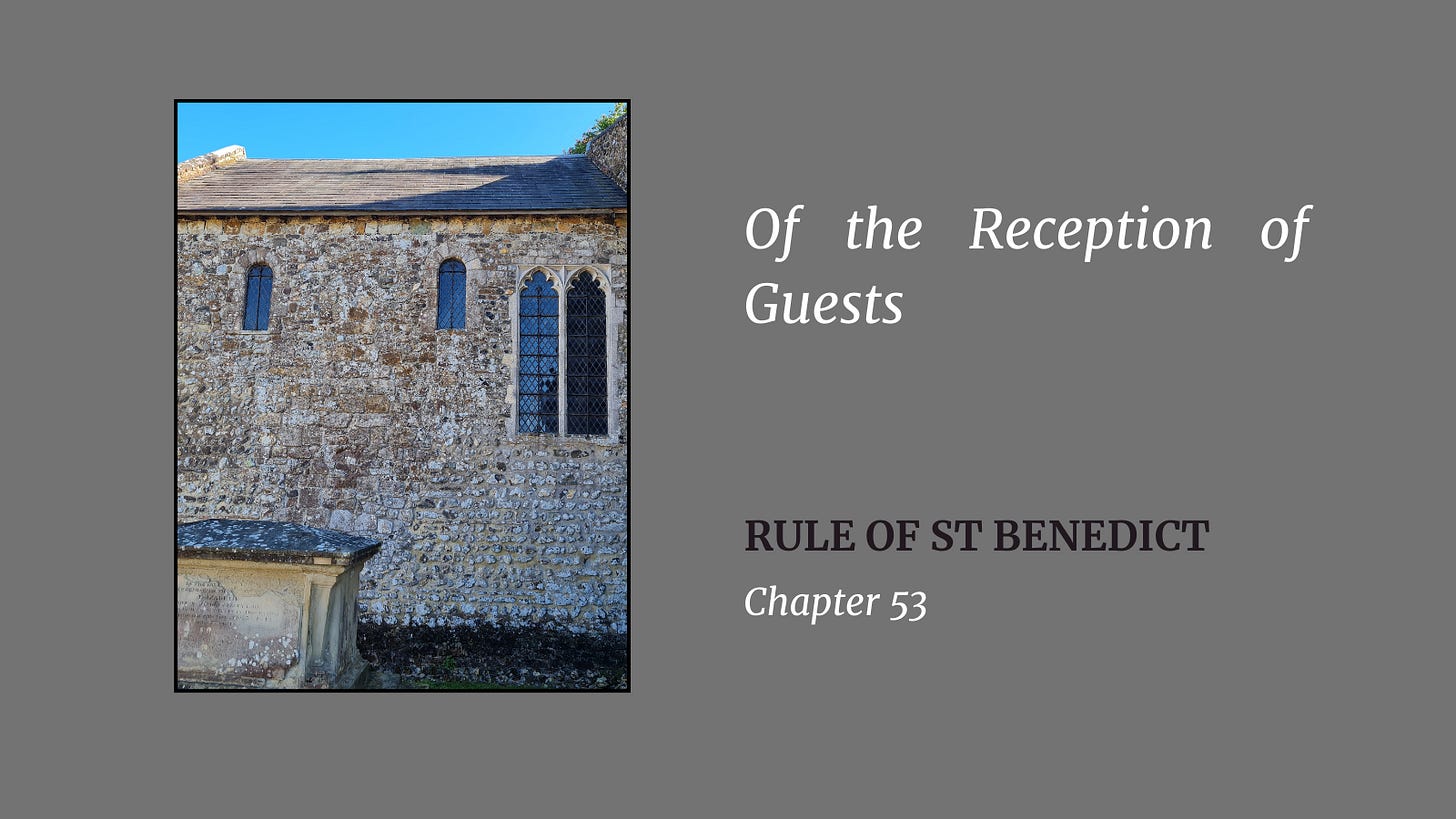Welcome to new subscribers! In this weekly post, I translate a chapter of the Rule of St Benedict, adding comments from other writers or my own observations.
A note on this week’s translation: the word “hospites” is commonly translated as “guests” but in fact it is much wider; including “strangers”, “foreigners”, people unknown to you in addition to “guests”. This is important in terms of the context of this chapter.
Text
Omnes supervenientes hospites tamquam Christus suscipiantur, quia ipse dicturus est: Hospes fui, et suscipistis me.
Let all guests [strangers] that arrive be received like Christ, for he will say: I was a stranger, and you took me in.1
Et omnibus congruus honor exhibeatur, maxime tamen domesticis fidei et peregrinis.
And let fitting honour be shown to all, but most of all to those of the household of the faith and to pilgrims.
Ut ergo nuntiatus fuerit hospes, occurratur ei a priore vel a fratribus, cum omni officio caritatis.
Therefore whenever a guest is announced, let the superior or the brothers run to meet him, with all the attention of charity.
Et primitus orent pariter, et sic sibi socientur in pace.
And first let them pray together and thus associate with one another in peace.
Quod pacis osculum non prius offeratur, nisi oratione praemissa, propter illusiones diabolicas.
But the kiss of peace should not be offered first, without first prayer, because of illusions of the devil.
Suscepti autem hospites ducantur ad orationem, et postea sedeat cum eis prior, aut cui iusserit ipse.
Once received, the guests should be led to prayer and after that let the superior sit with them, or whoever he himself should order to do so.
Legatur coram hospite lex divina, ut aedificetur, et post haec omnis ei exhibeatur humanitas.
Let the divine law be read in the presence of the guest, that he may be edified, and after this let all kindness be shown to him.
Ieiunium a priore frangatur propter hospitem; nisi forte praecipuus sit ille dies ieiunii, qui non possit violari. Fratres autem consuetudines ieiuniorum prosequantur.
Let the superior break his fast for the sake of a guest, unless it is a special fast day, which may not be broken. But the brothers should continue with the usual fasting.
Aquam in manibus Abbas hospitibus det; pedes hospitibus omnibus tam Abbas, quam cuncta congregatione lavet; quibus lotis, hunc versum dicant: Suscepimus, Deus, misericordiam tuam, in medio templi tui.
Let the Abbot pour water over the hands of the guests; let him and even the whole community wash the feet of all the guests; when they have been washed, let them say this verse: We have received, O God, your loving kindness in the midst of your temple.2
Pauperum autem et peregrinorum maxime susceptio omni cura sollicite exhibeatur: quia in ipsis magis Christus suscipitur. Nam divitum terror ipse sibi exigit honorem.
But for the reception of the poor and pilgrims especially, let every painstaking care be shown: for in them is Christ all the more received. For the fear of the rich themselves enforces [treating them with] honour.
Coquina Abbatis et hospitum per se sit, ut incertis horis supervenientes hospites, qui nunquam desunt monasterio, non inquietent fratres.
Let the kitchen for the Abbot and the guests be set by itself, so that if guests, who are never lacking in a monastery, arrive at unpredictable hours, may not disturb the brothers.
Item et cellam hospitum habeat assignatam frater cuius animam timor Dei possideat; ubi sint lecti strati sufficienter; et domus Dei a sapientibus sapienter administretur.
And let a brother, whose soul possesses the fear of God, be assigned to the guesthouse, where sufficient beds are provided; and let the house of God be administered wisely by wise men.
Hospitibus autem, cui non praecipitur, nullatenus societur neque colloquatur: sed si obviaverit aut viderit, salutatis humiliter, ut dictum est, et petita benedictione, pertranseat, dicens sibi non licere colloqui cum hospite.
Let no-one associate with or speak with the guests, if he is not assigned [to the duty]: but if he meets or sees them, after humbly greeting [them], as we have said, and having asked for a blessing, let him go on his way, saying that he is not permitted to talk with a guest.
Comment
At the top of this post I mentioned that the meaning of the word “hospites” can mean strangers as well as guests who you may know. I think it should be remembered that in the early centuries of the faith, Christian communities were small and scattered. When people came to churches, there were doorkeepers, to ensure that only those known to be Christians entered the sacred space. Likewise, catechumens and children were excluded from the eucharist and not permitted to be present during the sacred rites.
At the start of St Benedict’s mission, he removed all the pagan altars from Monte Cassino; paganism was still alive in many places, especially in the countryside where old practices lingered for a long time. And so we should see this chapter in that context. When someone turns up at the gate looking for food, water or a bed for the night, and you don’t know them, certain precautions are in order.
A monastery is a Christian house and so those who enter it must understand that and be willing to abide by its customs. Prayer when a stranger arrives is both a fitting way to welcome a guest and share God’s blessings with them, but also a means of determining if they are of the “household of the faith”. St Benedict tells us to be generous with all, but most of all with our Christian brothers and sisters. The recitation of the creed may be required to be sure they are indeed a member of the Christian family.
Dom Delatte tells us in his commentary that in the early centuries, unknown people were not admitted to communion without letters of recommendation and travellers in the Arian period would carry a document showing the Greek letters of the Trinity. So even within the “family” there could be people whom the monastery would not wish to host; heretics, dissenters, etc.
This is an important message which often gets overlooked these days; our first loyalty and duty is to our fellow believers. In most, if not all, ancient societies, and many today, there was a two-tier system. Foreigners and strangers were welcomed, as long as they would abide by the law of the country or region they were in. They may not be obliged to follow the religion of the state but as a result they also did not have the same rights and duties as those who did. This was a common practice of the past and still exists in some countries, most obviously those of the Middle East.
What are the “illusions” (or delusions) of the devil? The eastern Fathers said that sometimes the devil took human form to get inside a monastery and molest the monks. So prayer would act against any diabolical influence. In our times, people often laugh at the idea of demonic possession but personally, I have a strong belief that evil exists and can be incarnated into human form. I have seen enough evil through my work to be sure the devil exists. This is one reason I love to have holy water in my house and with me when I travel. You do not know what demonic influences may linger.
What is the “kiss of peace”? Again we go back to St Paul for this; he mentions it several times in Romans, Corinthians and Thessalonians. Was it a physical kiss on the cheek or a ritual gesture, such as happens in the Latin mass? Either way, it is a gesture of fraternity in the faith and clearly reserved only for Christians.
The guests are read “the divine law” - Dom Delatte tells us that at Monte Cassino there is a collection of short readings for guests, extracted from the writings of St Gregory. So this is the kind of thing St Benedict refers to; the reading of some suitable and edifying material to remind guests of the nature of their faith and to edify or instruct them.
The Abbot is expected to behave like Christ, in washing their feet and hands. We often forget that this action was very much the province of a slave or servant, which is why it was shocking to the disciples when Jesus did this for them. Of course, this is not practised these days, but in earlier times this was a ritual similar to the one on Maundy Thursday and not carried out immediately as the guest arrived.
A Guestmaster is appointed to manage all the arrangements and supervise those monks or, over time, lay servants who would do all the necessary chores and cook the food for guests.
What did the guests do while at the monastery? We don’t know very much but it seems that they were expected to conform to the monastery timetable for prayer and meals, along with keep silence in some ways or places. But guests would arrive at odd times and so St Benedict provides for a separate kitchen. In some places, the (male) guests would eat in the refectory with them monks; in others, a separate hall would be provided. The Abbot’s food was also prepared there as he was expected to eat with the guests. In time, this led to abuses, with vast guesthouses, kitchens and accommodation for Abbots which went well belong the intentions of St Benedict. Abbots no longer lived in the community but had their own houses, separate from the others.
The guest accommodation at Easby Abbey, Yorkshire. All the walls you see here belonged to it, but it also continued on the right, marked by the wall lines in the grass, where the guest accommodation was also combined with a large room used by the Abbot and his guests. All this was two-storey accommodation so quite extensive.
Monastic guest houses provided a practical function for travellers, whether aristocrat or lowly pilgrim on foot. They provided food and shelter, especially if they were located in sparsely-populated areas. Monastic hospitality was legendary and some monasteries had extensive arrangements for travellers. This could include a variety of accommodation; high quality and spacious rooms for the rich, smaller rooms with dormitory-style beds for lower status travellers or the sick. Women and children would often have their own rooms in an appropriate place. Monasteries of nuns generally did not admit guests into the grounds or had much smaller guest quarters.
Not a Benedictine foundation, but this model of Mount Grace Carthusian Priory in Yorkshire shows how extensive guest accommodation could be. Half of the site was given over to guest accommodation and agricultural storage/work buildings. The building at the bottom of this photo was the guesthouse. Horses were stabled in the buildings on the right. The laybrothers had their little hermitages in this area (the three little houses in a row) and they looked after the guests.
St Benedict lays down some rules for those monks who may encounter guests; they must not seek an opportunity to gossip or engage with them outside the mere bounds of politeness. While guests may be inside the monastic enclosure physically, a monk should ensure he maintains his spiritual enclosure. A monk’s life is one of prayer and seclusion.
The key thing to remember in this chapter is that by receiving travellers, we receive Christ himself and there is a general duty to hospitality. St Paul mentions that by giving hospitality, some have entertained angels without knowing it and the theme of hospitality is seen throughout the Old Testament.
Abbot Xavier Perrin sums up this chapter thus in his book “In the School of St Benedict”:
Hospitality is a fundamental attitude for Benedictines; it is the most visible expression of their service of humanity. Disciples of Christ, true God and true man, monks serve Christ in their guests, that is to say they play their part in giving them honour and take special care of what is most sacred in their dignity. Hospitality mobilises what is best in man, which consists in recognising in each person, known or unknown, someone loved by Christ, saved by his blood… through the abbot and the brethren specifically charged with hospitality, it is the whole community which welcomes the individual who knocks at the door. The community integrates him into the temporary communion which is like a sacrament of the eternal communion of the divine life to which we are all called.
Next Chapter
Have you seen my new publication - Shepherd’s Prayer? Available now via Amazon around the world, see here for more details.
Matthew 25:35
Psalm 47:10







